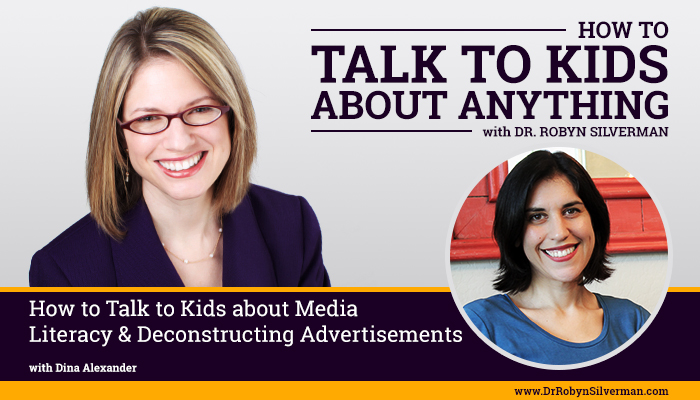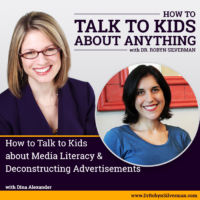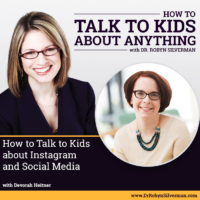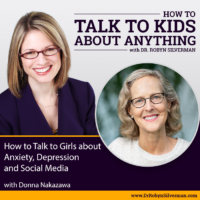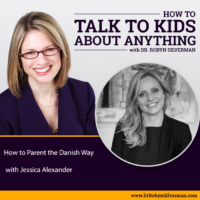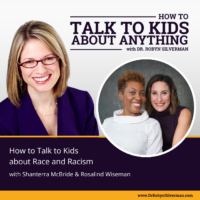Podcast: Play in new window | Download
Subscribe: Apple Podcasts | RSS | More
How to Talk to Kids About Media Literacy and Deconstructing Advertising
The podcast provides tips and scripts around media literacy and deconstructing advertisements. Podcast guest, Dina Alexander, discusses questions to pose, exercises to use and guidelines to construct in order to make a habit out of questioning and deconstructing the messages we receive through media.
Special Guest: Dina Alexander
Dina Alexander is the founder and president of Educate and Empower Kids (educateempowerkids.org), an organization determined to strengthen families by teaching digital citizenship, media literacy, and healthy sexuality 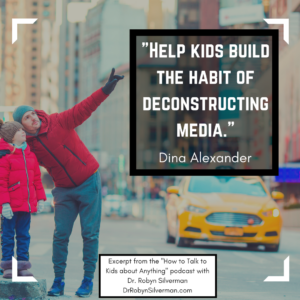 education—including education about the dangers of online porn. She is the creator of Noah’s New Phone: A Story About Using Technology for Good, Messages About Me, A Journey to Healthy Body Image, How to Talk to Your Kids About Pornography and the 30 Days of Sex Talks and 30 Days to a Stronger Child programs. Her new book, which we will be discussing today is entitled Petra’s Power to See: A Media Literacy Adventure, Dina received her master’s degree in recreation therapy from the University of Utah and her bachelors from Brigham Young University. She is an amazing mom and loves spending time with her husband and three kids. Together, they live in Texas.
education—including education about the dangers of online porn. She is the creator of Noah’s New Phone: A Story About Using Technology for Good, Messages About Me, A Journey to Healthy Body Image, How to Talk to Your Kids About Pornography and the 30 Days of Sex Talks and 30 Days to a Stronger Child programs. Her new book, which we will be discussing today is entitled Petra’s Power to See: A Media Literacy Adventure, Dina received her master’s degree in recreation therapy from the University of Utah and her bachelors from Brigham Young University. She is an amazing mom and loves spending time with her husband and three kids. Together, they live in Texas.
We are surrounded my media messaging everyday. The TV we watch, the billboards we see, the radio we listen to and the social media we read and share just to name a few. A great deal of our media is good- fine- interesting and even helpful—but there is a lot of media mixed in there that is useless or even harmful. Our children really need to know the difference. This is one of my favorite topics- I present on this topic and personally, it lights my fire as media is so powerful and has the ability to shape and break people. So how do we talk to kids about media and how to deconstruct, understand and critique it? Our old friend, Dina Alexander, who was already on How to Talk to Kids about Anything to discuss the topic of talking about sex and making babies—she is back to help us talk to kids about media literacy.
The podcast provides:
- Tips: What we can do to help our kids understand the impact of media.
- Tips: How we can teach our children to deconstruct media.
- Questions our kids can ask themselves when viewing advertising.
- Aspects to illuminate when viewing beauty and fitness ads.
- Scripts: How to discuss what to do when they see a post or when they are positing themselves.
- Tips: How to dissect fake news.
- Scripts: How do we begin talking about pornography, why it’s important to avoid and how to avoid seeing it.
- Guidelines: What rules or guidelines we should create so that our kids and family know our media policy in the home.
- Steps: How to talk to kids about what we don’t want them to see.
Important Messages:
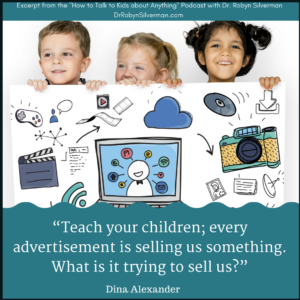
- Start early! Talk to kids when they are young so that you can make the tougher conversations for teens easier. You lay the foundation when you talk to kids in elementary school.
- Start here: Media is the way we send messages. Talk about the difference between reality and fantasy. What is the message here?
- Count the number of messages you drive passed or walk passed in the mall.
- Every advertisement is selling us something. There are questions we can ask ourselves and ask our kids. We are not typically taught how to deconstruct media.
- We need to get kids breaking down media so that it doesn’t take hold of us. What is it saying and what is it doing to you?
- Our brains try to make media illusions true- so ask- what do the advertisers want us to feel and know?
- Do a comparison between airbrushed and non-airbrushed images. These are accessible on the internet.
- Ask your kids; what are the pressures that are put on girls and boys in these advertisements?
- What characters are woman allowed to play?
- Show your children photos from instagram or facebook and ask: what am I selling?
- Teach kids that we are powerful- social media can be used to impact hundreds, thousands or millions people. Do you want to use them to show you what you are wearing on a Friday night or do you want to use it to change the world? It can be a grand message or a small message- but it can make positive ripples.
- Kids are used to believing what they are told. We need to teach them how to figure out if they are seeing a fake product or a fake news story.
- Show kids food styling and behind-the-scenes to show media illusions.
- Talk to your kids about media you don’t want them to see before they see it. This means violence and pornography. Be specific about what you don’t want them to see and what you mean by violence or pornography. Let them know what they should do if they see this kind of media.
- Take inventory of how much media your family is using. Come up with a policy regarding where media must be placed at night. Kids have impressionable brains.
- Family meetings are not just about what the adults want- it’s a coming together to discuss what’s good for the family.
Notable Quotables:
- “Media is the wallpaper of our lives. We don’t always take the time to understand it, we walk passed it, but our children are taking these messages in in much stronger ways than we usually acknowledge.”
- “Teach your children; every advertisement is selling us something. What is it trying to sell us?”
- “We are in an image-based culture. We need to be able to look at an ad and break it down before we start thinking; ‘I need that product!’”
- “When we see beauty ad, our brains are trying so hard to make it true even though we know it’s a computerized, airbrushed image. We are still comparing ourselves to her!”
- “The advertisers don’t care that an ad makes us feel bad. What they care about is if we purchase what they’re selling.”
- Exchange:
- Dina: “Women are not allowed to wrinkles and pores in many advertisements.
- Dr. Robyn: “Well, they don’t have pores or wrinkles and we should aspire to that.”
- Dina: “Right. They’re magical! Like unicorns!”
- “Our kids can not be what they don’t see.”
- “Whether we admit it or not, we are all trying to sell a message on social media. We are all selling a message.”
- “I show photos to children of my instagram and ask; what am I selling? The truth is, I’m selling ‘good mommy.’”
- “What is amazing about social media is that we can use it to teach our kids that we have the power to create media. We can sell ourselves, we can show ourselves in a bikini or we can use it to literally change the world.”
- “The power is within us. We live at a time, for the first time in the history of the world, that I can impact, if I choose to, hundreds, thousands, millions of people.”
- “The advertisers are hunting us. They are hunting our kids. They want our money.”
- “What are the messages in these advertisements?”
- “Don’t wait until your child sees something you don’t want them to see. Talk first.”
- “Take inventory of how much screen-time your kids are getting. Our kids have underdeveloped brains and they are far more susceptible to addiction that are adults. It’s like giving a beer to a 50 year old vs a 5 year old—there are very different things it’s going to do to our brains. It can affect us and we can get addicted so imagine what it can do to our children!”
- “I don’t watch something that I don’t want my kids watching.”
- “It’s not just the parents’ media guidelines but rather the family’s media guidelines. We are in this together. We are going to help each other out by having rules and standards we are going to keep to as a family.”
- “Help kids build the habit of deconstructing media.”
- “Plant the seeds and help them start the habit.”

